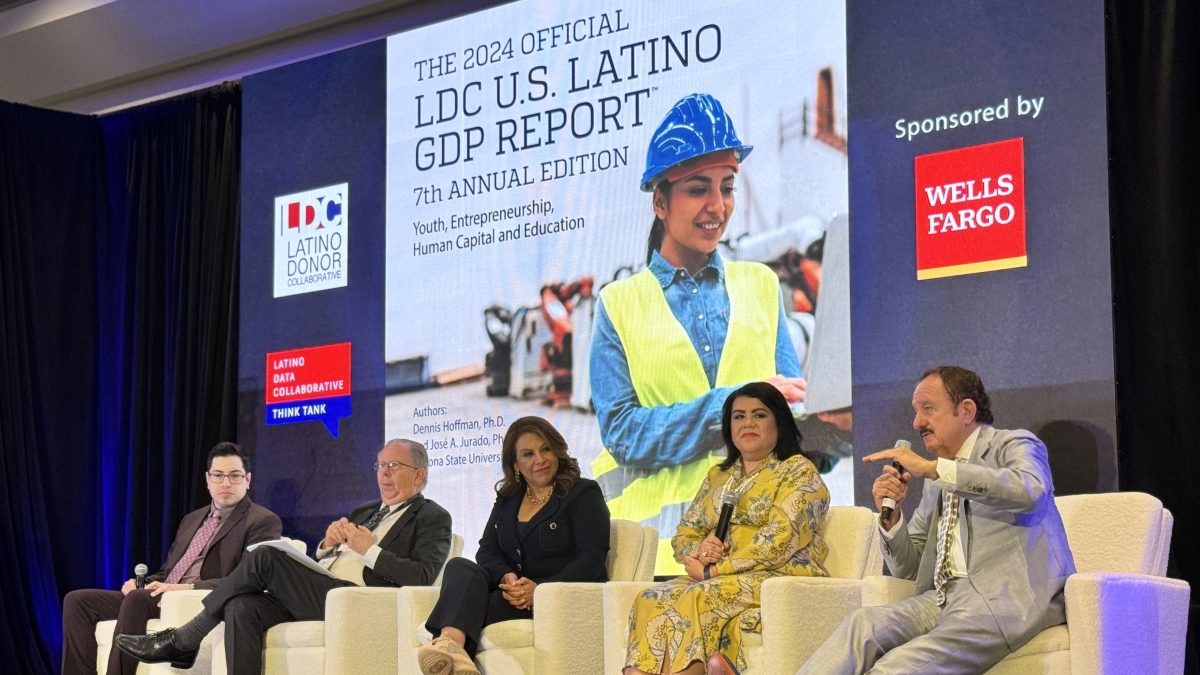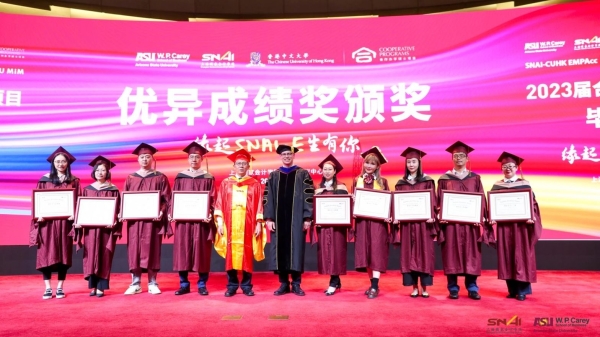Latino Donor Collaborative releases 2024 US Latino GDP Report

From left: Jose A. Jurado, principal investigator and research economist, L. William Seidman Research Institute; Dennis Hoffman, director of ASU’s Office of the University Economist and the Center for Competitiveness and Prosperity; Ana Valdez, CEO and President of the LDC; Patty Juarez, executive vice president and head of Hispanic/Latino affairs, Wells Fargo & Company; and Sol Trujillo, co-founder and chairman, LDC and L’ATTITUDE. Photo courtesy of Latino Donor Collaborative
For the second time since the announcement of their partnership, the Latino Donor Collaborative (LDC) and Arizona State University's W. P. Carey School of Business have released a report detailing the immense contributions to the GDP made by U.S. Latinos, who represent 19.5% of the country's population.
The 2024 Official LDC U.S. Latino GDP Report was released at the recent L'ATTITUDE Conference. The report, titled "Youth, Entrepreneurship, Human Capital and Education," is sponsored by Wells Fargo.
“Every year, thousands of U.S. Latino business leaders come together with a mission to learn how to use this data to influence real change, create actionable plans to engage Latino audiences, and support economic policy," said Sol Trujillo, co-founder and chairman of LDC and L’ATTITUDE. "The 2024 LDC U.S. Latino GDP Report continues to be invaluable for business decision-makers who are motivated by data to inform their growth strategies.”
The report features three additional innovations compared with last year, including forecasts of the Latino economy through 2029; a new section on U.S. Latino entrepreneurs, analyzing firm creation, employment generation, receipts, revenue and payroll by Latino origin, industry and firm size; and in-depth analysis of young Latino cohorts, who make a significant contribution to the current and future labor force.
Dennis Hoffman, director of ASU’s Office of the University Economist and the Center for Competitiveness and Prosperity, and José A. Jurado, PhD, principal investigator and research economist at W. P. Carey's L. William Seidman Research Institute, co-authored the report for the second year.
"This year's report outlines an important reality," Jurado said. "Latinos are driving important economic growth across the country and in Arizona, and we see that trend not only continuing but expanding."
Some important findings from the report include:
- U.S. Latino GDP grew 13% in nominal terms from $3.2 trillion in 2021 to $3.6 trillion in 2022, making it comparable to the fifth-largest economy in the world, just after Germany.
- The real growth in the U.S. Latino GDP is compelling, at 4.6%.
- Arizona is a top 10 state for measured Latino GDP, with $112.83 billion in 2022.
- Among the 10 largest Latino economies in the U.S., Arizona enjoys the third-largest contribution of Latinos to its GDP growth, at 38.1% between 2017 and 2022.
- The Arizona real annualized growth rate of U.S. Latino State GDP was 6.8% between 2017 and 2022.
"These numbers are striking," Jurado said. "As a researcher, we follow what the numbers tell us. And the numbers tell a compelling story in this case: U.S. Latinos play a vital role in our entire country's economic success."
The report additionally outlines the contributions of U.S. Latinos to the labor force, entrepreneurship and educational attainment. The national economy is increasingly reliant on Latinos to replenish the working-age (16 to 64 years) population. From 2021 to 2022, the number of non-Latinos in this population decreased by 673,000. This decline, however, was offset by an addition of 725,000 Latinos to the U.S. working-age population. Many of these new workers are starting new businesses, with Latino-owned businesses tending to be younger than comparable white-owned businesses, according to the State of Latino Entrepreneurship Report.
There have also been significant improvements in U.S. Latino educational attainment. Between 2010 and 2022, the percentage of U.S. Latinos holding at least a bachelor’s degree increased from 8.9% to 13.6%, while those with a graduate or professional degree rose from 4.1% to 6.8%.
"We are honored to partner with the Latino Donor Collaborative for the production of this important report," said Ohad Kadan, Charles J. Robel Dean and W. P. Carey Distinguished Chair in Business. "As a Hispanic-Serving Institution, ASU and W. P. Carey take seriously our responsibility to engage with the Latino community in both education and knowledge creation to open doors, create opportunities and drive economic growth."
More Business and entrepreneurship

New ASU certificate to address veteran underemployment
Veterans and military spouses bring a wealth of talent to the corporate world. Unfortunately, human resources and hiring managers without military backgrounds often struggle to understand…

ASU China Executive MBA ranked No. 7 in world by Financial Times
In the 2024 Financial Times rankings for Executive MBA (EMBA) programs, Arizona State University's W. P. Carey School of Business China Executive MBA program ranked No. 7 in the world, ahead of the…

ASU, Ghana partnership enhances supply chain practices in Africa
As a New American University, ASU defines the communities it serves as including both its backyard neighbors and colleagues around the world. For the past four years, Arizona State University…